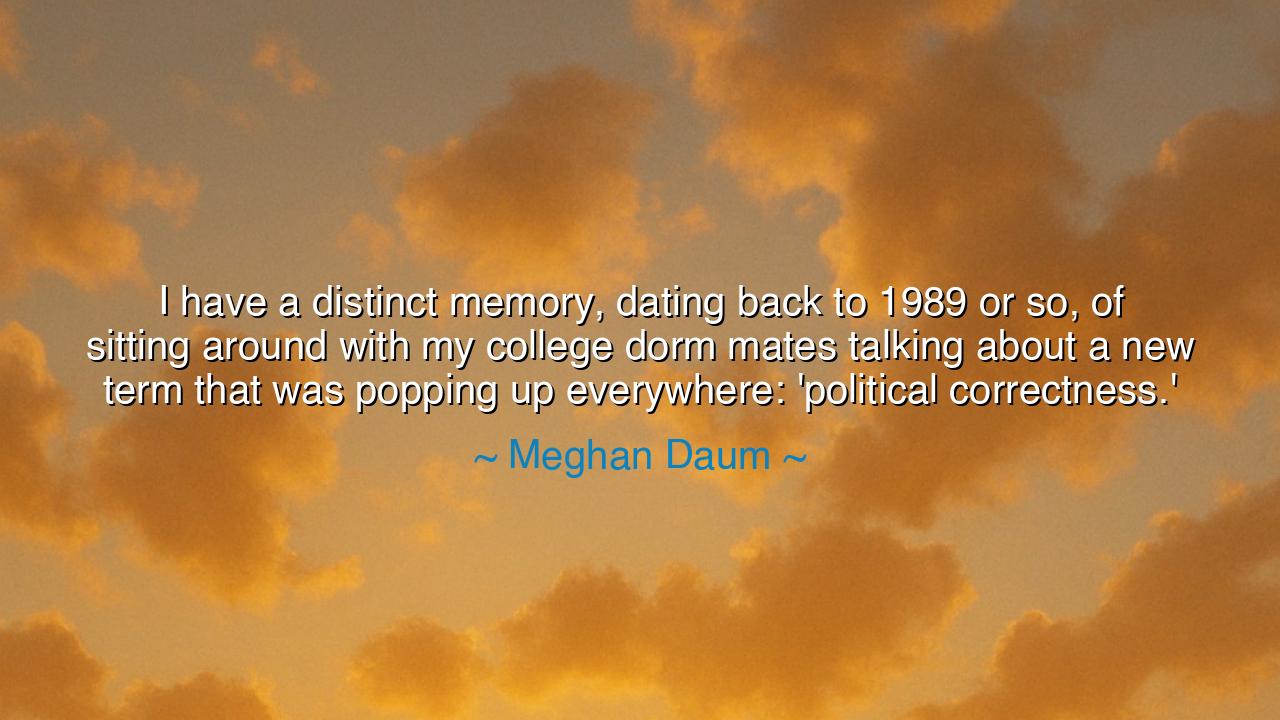
I have a distinct memory, dating back to 1989 or so, of sitting
I have a distinct memory, dating back to 1989 or so, of sitting around with my college dorm mates talking about a new term that was popping up everywhere: 'political correctness.'






In the words of Meghan Daum, writer and observer of the shifting tides of culture, there lies a quiet yet powerful recollection: “I have a distinct memory, dating back to 1989 or so, of sitting around with my college dorm mates talking about a new term that was popping up everywhere: ‘political correctness.’” At first glance, this may seem a simple remembrance of youth, but within it beats the pulse of an era — the dawn of an idea that would come to shape public discourse for generations. Her words are not merely nostalgic; they are a reflection on the moment when society first began to wrestle openly with the boundaries between truth and sensitivity, between freedom of expression and moral restraint.
In the late 1980s, as Daum recalls, the term “political correctness” began to echo through the halls of universities, newsrooms, and public squares. What had once been a phrase whispered in the corridors of activism was now bursting into the mainstream. Its purpose was noble in origin — to encourage fairness, inclusion, and the careful use of language in acknowledging others’ dignity. Yet even in its infancy, it stirred unease. Young thinkers, like Daum and her friends, sensed both the promise and the peril of this new awakening. The phrase carried within it both light and shadow: the light of compassion and progress, and the shadow of conformity and control.
The origin of this idea reaches back even further — to revolutions of mind and speech that have always tested the limits of freedom. Every civilization, from Athens to Rome, has known this tension. The ancient philosophers debated the balance between virtue and liberty, between rhetoric and truth. Socrates himself fell victim to his era’s version of “political correctness,” condemned for “corrupting the youth” by questioning accepted norms. And so Daum’s memory, though set in 1989, is part of a much older story — the eternal struggle of humanity to refine its speech without silencing its soul.
Her recollection also speaks to the awakening of a generation — the moment when young minds first perceive that ideas themselves have power. In her dorm room, surrounded by laughter and debate, Daum and her peers stood unknowingly at the edge of a new cultural age. They felt the first tremors of a world in which words would carry new weight — where language would no longer be a mere vessel for thought but a moral battleground. From those conversations would grow decades of argument: What is kindness, and what is censorship? What is respect, and what is fear? Daum’s memory is the seed of that long and ongoing dialogue.
The story of Galileo provides a parallel from the ancient lineage of truth-tellers. When his discoveries challenged the authority of his time, he too was told that his words were dangerous, that he must restrain himself for the sake of order and decency. He obeyed in silence, but whispered still, “And yet it moves.” Like the debates of Daum’s youth, his struggle reminds us that progress and repression often share the same birthplace — that in every age, new ideas must fight through resistance, misunderstanding, and fear to find balance.
Daum’s reflection, spoken with the calm distance of hindsight, reminds us that the concept of “political correctness” was never just about words — it was about identity, power, and belonging. The yearning to speak rightly arises from the noble desire to honor others, yet when taken to excess, it can harden into rigidity, stifling the very diversity it seeks to protect. Her memory of those early conversations, therefore, is not one of mockery or judgment, but of awe — awe at how swiftly human ideals evolve, and how perilous it is when good intentions become instruments of division.
The lesson we draw from her words is one of balance and humility. Let us speak with care, but not cowardice; with empathy, but not fear. Let us remember that the pursuit of justice must never silence the pursuit of truth. The ancients taught that wisdom lies in the middle path — where speech is neither reckless nor restrained, but guided by integrity. And so, in our own time, as we navigate the storms of discourse, let us remember Daum’s image of the dorm room — that place where young hearts once debated with laughter, honesty, and curiosity. For it is only through such fearless and open conversation that society continues to grow.
Thus, Meghan Daum’s memory becomes more than a recollection; it is a mirror of civilization’s journey. Each generation sits in its own circle, speaking of the words that shape its destiny. The challenge remains the same: to use language not as a weapon, but as a bridge — not to divide, but to enlighten. In this, her quiet remembrance becomes a call across time: that we, too, might choose truth over comfort, and courage over silence, as we seek to speak — and to listen — with both heart and mind.






AAdministratorAdministrator
Welcome, honored guests. Please leave a comment, we will respond soon